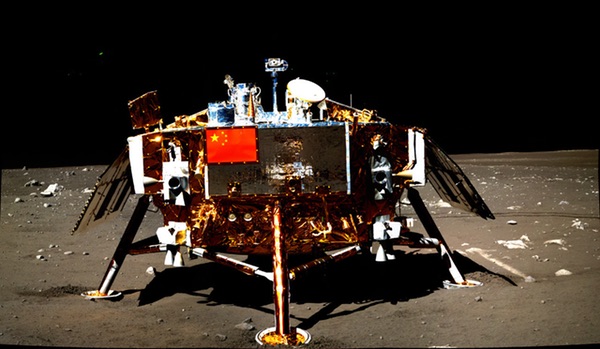Racing China to the high frontierby Mark R. Whittington
|
| A new space race is developing for a prize greater than the one won in the first Moon competition. |
Fifty years later, the United States, this time with allies, is embarking on a return to the Moon, this time to eventually establish a lunar base. The outpost is envisioned to be a center of scientific research and commercial development that will enrich the participants in ways that are currently beyond evaluation.
However, China also has designs on the Moon, which do not bode well for the American-led alliance. A new space race is developing for a prize greater than the one won in the first Moon competition. A recent article in The Diplomat explained:
What China aims to achieve from its space ambitions is to establish alternative institutions, investment mechanisms, and capacities that not only challenge U.S. dominance in space but establish a China-led space order that it projects as benefiting the world. While this may not result in a space ‘arms race’ like we saw during the Cold War, it will offer a viable political alternative to the current space order led by the United States.
In effect, just as with its artificial islands in the South China Sea, Beijing is seeking space dominance that it does not envision sharing with other countries.
As GeekWire reported, the prospect of Chinese space dominance has become a concern for American space policymakers. At the recent ScienceWriters 2018 conference in Washington, Scott Pace, the executive secretary of the National Space Council, and Harrison Schmitt, Apollo 17 moonwalker, ruminated about how the stop/start aspect of American space efforts has stymied the drive to return astronauts beyond low Earth orbit.
Within the past ten years, NASA has been directed to return people to the Moon and then head to Mars; to bypass the Moon, retrieve an asteroid, and then head to Mars; then go back to the Moon and then go to Mars again. It’s a kind of attention deficit disorder where space policy does not survive a change of presidential administrations.
The new space race, according to Pace, will not only be a national security one, but a commercial one. The United States has billionaire entrepreneurs such as Elon Musk and Jeff Bezos. But China is starting to create a commercial space sector as well, albeit not yet as developed as the American version.
| Of course, a proper space race is not going to win itself. The United States and its allies have to maintain focus, year after year, across changes in government. |
However, if the United States suffers from attention deficit disorder concerning space efforts, China has an even greater problem. Chinese President Xi Jinping is cracking down on dissent and even on behavior considered to be “anti-social.” The social credit system, which uses video monitoring and the Internet to track the behavior of Chinese citizens, offering rewards for “good” behavior and punishment for “bad” behavior, is something out of a dystopian science fiction novel. The system being set up by Beijing may crush anti-social behavior but it will also squash the sort of creativity needed to conduct a successful space race. People need to be free to question and even argue about current policy. If Chinese scientists and engineers are too afraid to show initiative, they will operate at a distinct disadvantage to their Western counterparts.
Of course, a proper space race is not going to win itself. The United States and its allies have to maintain focus, year after year, across changes in government. They have to allocate adequate resources to the effort and not fool themselves into believing that the high frontier of space can be won on the cheap.
What are the stakes? In one future, a thriving space economy based on resources from the Moon and from Earth-approaching asteroids, orbital manufacturing, and space tourism. In the other future? The Diplomat offers one vision:
What a China-led space order would look like is something the international community needs to seriously grapple with. For as Xi directed, the SSF [Strategic Support Force] must be subordinate to and serve the ‘absolute leadership’ working within the principles and ideology of the Communist Party of China, an authoritarian political system that does not tolerate any opposition. Is that what we aspire for in the final frontier?
Indeed, not.
Note: we are temporarily moderating all comments subcommitted to deal with a surge in spam.
